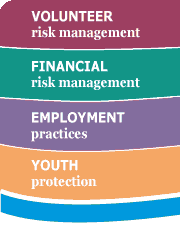Leaving With the Captain?
By George L. Head, PhD Special Advisor, the Nonprofit Risk Management Center
 A colleague recently asked me to contribute some ideas for her presentation to an audience interested in evacuating aged and disabled occupants from high-rise residential buildings. Born with cerebral palsy and never able to stand, I believe my experience as a disabled person traveling on airplanes gave me some special insights into her topic.
A colleague recently asked me to contribute some ideas for her presentation to an audience interested in evacuating aged and disabled occupants from high-rise residential buildings. Born with cerebral palsy and never able to stand, I believe my experience as a disabled person traveling on airplanes gave me some special insights into her topic.
My Particular Case
When I fly commercially, two airline employees in the jet-way normally lift me from my wheelchair, strap me onto an "aisle chair," move me on that chair into the plane, then transfer me from the aisle chair to my seat. (An aisle chair is like a wheeled stretcher, bent into a sitting position, which is narrow enough to fit down the center aisle of an airplane.) Quite often while waiting for take-off, the chief flight attendant or a member of the flight crew explains to me that in the event of an emergency some of the crew will use that same aisle chair to get me off the airplane — but only after all the other passengers have been evacuated. I will then leave, or I will die, with the captain.
The airlines' policy recognizes that disabled people move more slowly than the able-bodied under almost every imaginable circumstance. The airlines correctly profile me and other disabled passengers as a hazard to others on board a plane when evacuation emergencies arise. I also feel that their "you-leave-with-the-captain" policy is much better for me than some other safety policy options the airlines might adopt. These policies could include (1) not taking me as a passenger at all unless I can evacuate a distressed plane on my own; or (2) limiting me to choose only from infrequent, special, disabled-only flights.
For me to expect or for airlines to grant me any special preference in emergency evacuation would almost certainly cost more lives than it would save. Lawsuits would surely be brought against an airline on behalf of those needlessly killed just to get me off the plane as a priority passenger. In these emergencies, an airline's ethical duty is to save as many lives as possible. Based on the assumption that the lives of all the passengers aboard a given plane are equally valuable, the airlines cannot make "moral triage" judgments as to which passengers' lives are more worthy of saving.
Personally, I am very comfortable with leaving — or dying — with the captain. Yet I recognize that other disabled people in such an emergency situation would believe that I am consenting to suicide and would not accept the airline's terms. Everything depends on the premise that all lives are equally worth saving in any emergency situation — whether on an airplane, in a high-rise or in your nonprofit.
Your Nonprofit's Case?
Many nonprofits focus their mission on serving clientele with specific disabilities. During any emergency situation, these disabilities, whether physical or cognitive, are very likely to impede the timely evacuation of all occupants from danger. Do your nonprofit's leaders truly believe that all lives are equally worth saving when, in an emergency, practical priorities will almost be certainly be given to the able bodied, not to your nonprofit's clientele? More specifically:
- Should your nonprofit better prepare disabled clients to realize that, in a public emergency, they will most probably be the last to be rescued?
- Should we finally put to rest the uplifting but unrealistic social myth of "Women and children (and the old and disabled) go first" in any emergency?
- When we as a nonprofit allocate our scarce resources among our many disabled clients, do we truly act upon the belief that every life is equally valuable and worth saving — or do we (should we) favor some clients' lives over others?
These questions are not easy to answer. Nonetheless every disabled person, and ultimately every nonprofit, must confront them. Each disabled person — each disability-focused nonprofit — is likely to find a slightly different answer. I have given my own answer: Yes, take me out last so that as many others as possible may live. Others will disagree with me or will think me insincere. Yet every disabled person able to do so has a right to make his or her own choices. Every disability-centered nonprofit has a corresponding duty to educate each client so that he or she is psychologically and ethically prepared for the rescue-priority decisions that true emergencies suddenly force upon us.
Life-threatening emergencies will happen; are your nonprofit and your disabled clients ready in their minds and hearts?
[Note: I thank Lisabeth A. Groller, one of my personal care aides, for her substantive contributions to the foregoing thoughts.]






